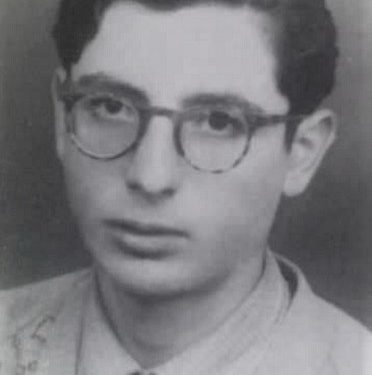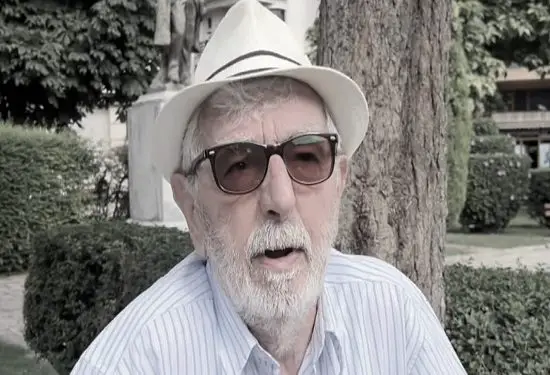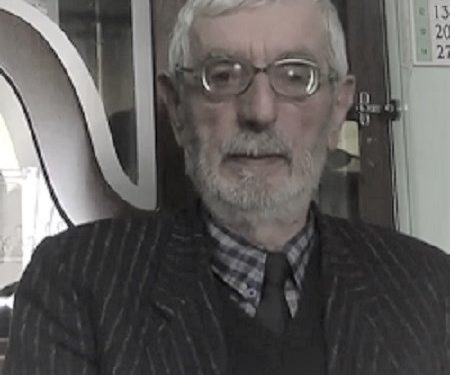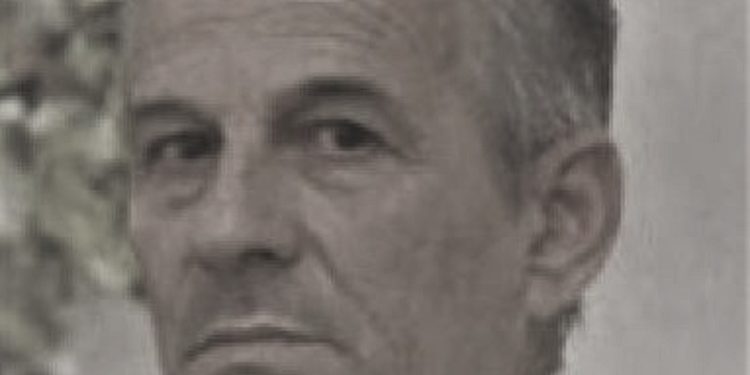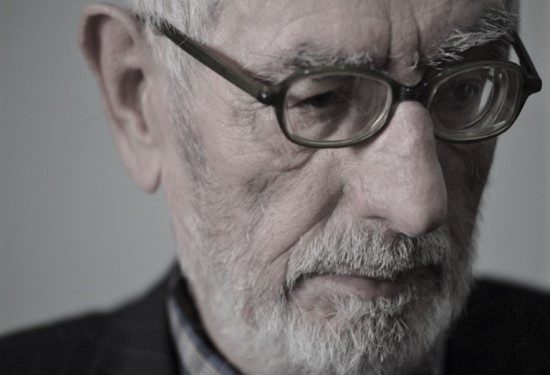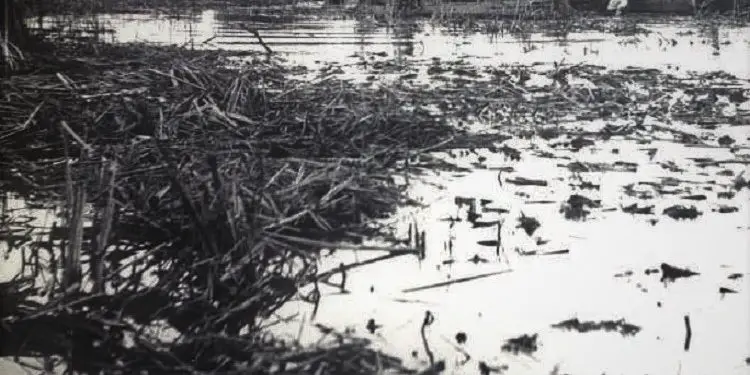From Vepror Hasani
Second part
Memorie.al / “In the marsh with reeds of Maliq, a strange voice started to be heard,” Ylber Merdani begins to tell us. – It looked like an outburst. It was a voice that screeched with a long-winded u-u-u… that startled and frightened every passerby. Someone said it had been the last swamp ox, the strange bird that lived in that place. He flew from one end of it to the other, emitting his wailing voice. It had never happened like this before. His voice was heard early in the morning and late at night; when the darkness turned pitch black. Someone said something bad was about to happen…! In the swamp space, much blood would be shed, many people would be killed, and thousands more would suffer…! The bull’s voice would be heard for many years to come. Over time many people were convinced that the ox had either left the swamp or been killed by hunters, but hearing his voice remained an inexplicable wonder. It wasn’t just the ox that was starting to feel scared, but also the ducks, the geese, the pelican. Birds and swamp creatures had begun to hide in the reeds. Flocks of birds looked like they were preparing for a great flight. The elders saw it as a bad sign. Eels and fish, as if they were no longer feeling their movements. It was in those days that the news about the drying up of the Maliq marsh had spread. A ghastly scenario was prepared long ago. Maliq’s swamp would turn into a hell, a huge grave, where people would be buried alive in the mud of the embankment. All opponents of the regime would be eliminated one after the other. In addition to the Maliqi camp, the camps in Vloçisht, Nizhaves and Orman – Pojan would also operate, which would take lives of people until 1951″.
Who were the convicts?
“Vehxhi Buharaja, the translator who made Sadiu speak Albanian, would suffer the punishment there, – Merdani continues with his story. -He was from Berat. He was arrested in 1946 under the charge of agitation and propaganda against popular power. They would also bring there Mitrush Kutel (Dhimitër Pasko), the father of the Albanian narrative, graduated from the University of Bucharest for Economic Sciences.
He returned to Albania in 1942 with the hope of contributing as a writer and publicist, but also as a translator. He knew several foreign languages. It brought translated many literary works of world writers. He wrote many Albanian narratives: “Autumn of Xheladin Bey”, “Albanian Nights”, “Kapllan Aga i Shaban Shpatë”, “Ago Jakupi”, etc. He was arrested in 1947. They would also bring Pashko Gjeçi, the translator of Dante and Homer, to the Maliqi swamp.
He was from the city of Shkodra. He had studied at the University of Rome in the Faculty of Philosophy and History. He was arrested in 1947. The Chief Mufti of Shkodra, Hafiz Ali Kraja, would come to the Maliqi swamp. In 1922, he was a member of the Albanian Parliament. In 1943, he was exiled by the Italians to Porto-Palermo for his anti-fascist attitude. He was a friend of the great poet Gjergj Fishta.
The speech that Kraja gave at the funeral of his friend, Fishta, remained unforgettable. He was arrested in 1947. He stayed in prison cells for 18 years in a row. They would also bring Fan Noli’s personal secretary in America, Andon Frashër. Not infrequently they made fun of him: “Mr. Frashëri, call Fan Noli now to save you”! The diplomat Eqerem Janina, married to the granddaughter of Sultan Hamit, master of 8 foreign languages, would also end up there.
The suicide of the colonel, Sulejman Vuciterna
The poet Ylber Merdani was silent for a moment and after a moment he started to speak again. – “It was October 15, 1948. On that day, something scary, but also unbelievable, would conquer all the prisoners of the Maliq swamp. Perhaps it had been the wailing of the swamp ox that had carried the news to every prisoner. Sulejman Vuciterna, the Kosovar colonel, the commander of 400 men who had withstood the Serbo-Montenegrin attacks, had attempted suicide.
Trembling and horror left no one untouched. The news that was spreading was even worse, even blacker. The guards and policemen were not trying to save his life, but were rushing to take him away. They were afraid that he would be resurrected. After a while, everyone started talking only about this terrible event. Many of the prisoners had either known Sulejman Vuciterna before, or had heard about him, or had met there and learned why his friends called him “the colonel”.
Everyone already knew that Sulejman Vuciterna was born in Vuciterna, Kosovo, that he had joined the resistance movement since he was 16 years old. They also knew that when Vuciterna was 18 years old, he had come out at the head of 400 men from Drenica, Mitrovica and Vuciterna, because he had decided to repel the Serbo-Montenegro attacks. The Serbian government had sentenced him to death, so they were looking for him from place to place.
In 1922, Vuciterna was able to escape the siege, but while his tower was set on fire, his brother remained inside amid the flames. He came to Albania, where he completed the “Normal” of Elbasan, the military school of Tirana, then the Military Academy of Turin in Italy, and after that he would finish his specialization in Graz, Austria. Finally, he was appointed director of the military school in Tirana, where he holds the rank of lieutenant colonel. In the Albanian National Army he served as quartermaster in Korça, Shkodër, Berat, Durrës, Kavaja and elsewhere until 1939.
With the invasion of Albania by Italy, he left the country to return again in 1941, next to the Albanian Army with the task of Northern Commander of Kosovo (border with Montenegro, Serbia and up to the border with Bulgaria). He held the rank of colonel. He was treacherously arrested by the Slavo-Communists of Tirana in November 1944, together with many Albanian intellectuals and nationalists. The “Special Trial”, in March 1945, sentenced him to 30 years in prison. The news had already spread that this invincible man had sought suicide.
Perhaps it was impossible for him to see innocent people being beaten, tortured, hanged on ropes and shot. He could have lived, but those who had arrested him did not want his life. I saw Sulejman Vuciterna with my own eyes, said Sezai Garo, when he was trying to commit suicide. He raised his waist, shot hard and cut his toes. All of us who were there got up to help him.
We tied his leg with cloths to stop the flow of blood, but at that time the guards arrived, followed by the camp commander Tasi Marko. “Who is this?” asked the camp commander. “Sulejman Vuciterna”, they answered. “Untie the wound”, he said, Vuciterna is a criminal. Take it and throw it away! You know where these criminals are.” Later, it would be found out that Sulejman Vuciterna had been thrown into the mud when his soul had not yet come out.”
Spies
“Nothing remains unknown – says the poet Merdani and after that he continues: “A lot of time had passed and the prisoners had already realized that among them there were ordinary prisoners and people who were paid to do the work of informer or provocateur. They realized that a whole network of spies was operating. Many of their comrades had fallen prey to provocations, had been beaten and tortured, and had even been drowned alive in pits of mud and feces. They had to be careful.
It all started with the director of the camp, Tasi Marko, who was Rita Marko’s brother. He saw to it that each of his servants was more ruthless than the next. His subordinates also knew this. They made every effort to gain the appreciation of their commander. Corporal Murat Xega, who did the work of the deputy commander, had the desire to surpass his commander. Security employee, Kristaq Katundi, known by the nickname “Akruti”, was one of the leaders of this network of spies and provocateurs.
The leader of the brigade, Beqir Koleci (prisoner), a former communist major who no one knew why he was imprisoned, was nothing but a Security agent, terrible and heartless, so much so that he competed with the guards to who treated the prisoner’s worse. Brigadier Azis Alla didn’t escape either; he was always there where the prisoners were tortured. Behind them were all the spies: Trajan Xheka, Muharrem Qafëzezi, Hito T., etc. They were many.
The only person who is remembered for his great spirit was the doctor Isuf Hysenbegasi. Maybe he was one of the people who managed to save people’s souls. There were enough ordinary prisoners who, commissioned by the State Security, provoked the prisoners. It was Trajan Xheka who, in the fall of 1948, spied on his friends. After that, Niko Kirka and Skënder Stefanllari, etc., would be subjected to inhumane torture. It was the spy Hito T., who shot the prisoner Servet Haxhia in the back, who remained lame for life.
Because of the spies, Josif Ballauri was tortured so much that he lost his sight for life. Qani Sulejmani broke his hands by hitting him with wood. Father Kosta Bezhani, was inhumanely tortured. Veli Ballolli was tortured for days, only because one of his fellow villagers managed to escape. Virtut Gjylbergu was killed under the pretense that he wanted to escape, as were two boys from Peqin and a boy from Luaras, (I’m sorry I didn’t manage to learn their names), as well as many others.
Honest nationalists would also be punished for sabotage: Bego Gjonzeneli, Klito Lamaj, Hamdi Gjoni, Burim Kokoshi, Fadil Djindi, etc., who were taken to the prison of Kučova or Vlora, where they were tortured to admit that they wanted to sabotage the drying of the swamp. The merchant Kostë Fundo, by order of the command, was dragged by ordinary prisoners to the door of the camp where he died. Koçi Mirasi, who was found hanging in the warehouse, the policemen pulled out his gold teeth with blacksmith’s tongs.
A boy from Librazhdi saw his father dying, but the police did not allow him to approach him. In Maliqi’s camp, you also found people from the same family, such as Karafil Bylykbashi, together with his son Servet Bylykbashi. Miltjath Terezi also died from torture, etc. The prisons that were subordinate to the People’s Division were transferred to the People’s Police. Thus, the same body was spying on you. Imprison, investigate, torture or shoot with or without trial”.
DEALERS
“I was very young at the time when I was imprisoned, Xhahit Met’hasani confessed to me,” Merdani recalls, “and he should continue with Met’hasani’s confession. After I was convicted by an animal investigation, I was taken to the Vloçishti camp. One morning nine newly arrived men lined up with us. They were old and tired from the long investigation. We learned that they were merchants from Korça who had tortured them for a long time in the interrogator, to force them to extract the gold. Someone had died during the investigation.
Two of them couldn’t stand it and died there, next to the dirt carts. I cannot forget one of them, the prisoner who had just arrived, was pushing the cart which creaked but did not move from its place. The prisoner gathered his strength again and tried to pull the cart out of the place. Suddenly I saw that he was slipping, his feet were off the ground and he was flying towards the depth of the canal. I, says Met’hasani, was working inside the deep channel. It was all happening very quickly.
The prisoner (although he was falling), put his hand to his heart, looked at me with squinting eyes, as if asking me for help, tried to keep himself in the air, spreading his arms to the sides, but even trembling all over, he gathered himself like a tangle and rolled over onto its side, falling into the canal. I hastened to catch him, but I could not, for the guards arrived at once, curse with obscene words. They started kicking, but he was dead…! That day I found out that his name was Sotiraq Lako, he had been a merchant.
This was not the only case. The merchant from Korça, Bexhet Frshëri, a former deputy during the time of the Kingdom, although he was very old, they tortured him at work by demanding the rate, which was impossible for his age and physique, they pushed him and hit him and these were accompanied by insults and the dirtiest words. Bexheti, already weakened and helpless, could not follow the crowd of prisoners rushing to return to the camp. He fell to the ground with bulging eyes; the police immediately surrounded him and were kicking him, drowning him in the mud. He looked into their eyes, as if he wanted to thank them, for saving him from his troubles and sufferings.
Bexhet Frashëri was thrown into the embankment and covered with earth (mud). Through such torture, lawyers such as: Vangjel Golgota, Shefqet Çelkupa, Fuat Asllani, Qamil Xhaja, or journalists Koço Semini and Fiqiri Llagami would spend years in the Maliq swamp; pharmacists Alfred Ashiku, Mikel Kilica, Vlash Dushniku, and many others who experienced the communist hell in the Maliqi camp, in Vločisht, in Nizhavec and in Orman Pojanit
Mehmet Shehu
“The prisoners worked on draining the swamp from April to November. Finally, the rainy season had arrived and the prisoners would be taken through the closed prisons, to return again in the spring. Of course, only those who remained alive would return. The prisoners were looking forward to leaving the swamp. The prisoners were lined up next to the cars. The policemen started reading the names. Whoever heard the name, hurried to get in the car? Shefqet Shehu from Peshkopia was also in the row.
When he heard the name he made to move, but he saw that it would be difficult. He was the most crushed of all the others. He grabbed the side of the body, gave his body hard, but his hands slipped, he couldn’t hold on and fell to the ground. The guards did not run to hit him as they all did with the prisoners, but beckoned to Beqir Kolec. By the way, he had expected this. He attacked Shehu, as if he were a beast and started kicking him. Then he took a stick and started hitting him on the head, while we couldn’t do anything to help him.
Even if we tried we would have the same fate as him. Only when he got into the car, we tried to clean the blood from his face, but he only moaned. He died in Tirana prison. Nothing is known about how it happened. The prisoners would be out of the swamp anyway, at least for a few months. Some would stay in Tirana prison and others in prisons in other cities. When the prisoners of Tirana had arrived at the prison, Mehmet Shehu had gone to inspect them, together with Shefqet Peçin. It was the time when Koçi Xoxe and others were convicted.
Mehmet Shehu and Shefqet Peçi asked the prisoners how they had fared in the Maliqi swamp. The prisoner Llambi Llambidhi said: “Not even in the Middle Ages were the tortures that were done to us there.” Then they went to another room, where a former student who studied in Italy, S. Pipa, was staying. Although Mehmet Shehu had entered his room, he did not stand up. They asked him: “Why didn’t you get up? And he answered: “I don’t have the strength to get up after the suffering I suffered in Maliq”. Mehmet Shehu asked him again: “How much is left of your sentence?” S. Pipa answered: “I don’t know how many more days I have left after the horror I experienced in Maliq”.
Not even Dante Alighieri…!
Maliqi’s ex-prisoner, Peti Zisi, said: “Not even Dante could describe Maliqi’s cowardice.” Among my co-sufferers, I remember many names: Mitrush Kuteli (Dhimitër Pasko), Arshi Pipa, Ibrahim Hasanaj, Pashko Gjeçi, Father Zef Pëllumbi, Koço Semini, Nedin Kokona, Skëndër Shtylla, Sami Kokalari, Sulejman Vučiterna, Neis Nasho, Guljem Deda . Llambidhi, Mazllem Lamçe, Vangjel Golgota, Shefqet Çelkupa, Fuat Halimi, Mirash Ivanaj, Fuat Asllani, Gani Selenica, Klito Lamaj, Burim Kokoshi, Lefter Qirici, Fadil Djindi, Andon Frashëri, Qemal Çoçka, At Thoma Vërleni, Hysen Çaushaj, Halit Selfo , Vehxhi Buharaja, Isa Kokalari, Napolon Tasi, Irfan Pustina, Bexhet Shehu, Nexho Reka, Anthim Kokonomi, Luigj Radoja, Kel Çoba, Enver Shijaku, Spiro Treska, Syrja Isak, Qazim Bllaca, Irfan Pustina, Shefqet Shehu, Ramo Sali Frashëri, Mafmut Bordi, Dane Zdrava, Petraq Ka tro, Mark Dindi, Vaskë Katundi, Dom Mikel Koliqi, Dom Nikoll Mazreku. Father Jak Gardini, Father Karlo Serreqi, Nuçi Face, Stefanaq Plumbi, Bexhet Frashëri, Petrit Berisha, Tefik Gabrani, Zihni Dervishi, Shaban Xhyheri, Eqerem Sora, Llambi Napuçe, Pandeli Zografi, Ali Tirana, Gjergj Koçi, Veli Balolli, Servet Haxhia, Hiqmet Cerolli, Faik Selenica, Uran Starova, Sezai Garo, Niko Kirka, Mihal Stratobërdha, Bego Gjonzeneli, Osman Bishqemi, Sami Repishti, Ejup Gjyrezi, Veniamin Dashi, Ramazan Tabaku, Fatbardh Kupi, Asan Kalaja, Skënder Stefanllari, Peti Zizi, Ismail Dvorani , Father Sifi Papamihali, Ligor Shalsi, Father Qazim Kuçi, Father Muharrem Kreshova, Myqerem Janina, Petrit Kadilli, Ilo Katundi, Ymer Fazlli, Hafëz Ali Kraja, Father Jorgji Kosta Bezhani, Taqi Fundo, Kola Kozmai, Andon Tashko, Hajdar Vebiu, Ali Qyteza, Sadik Zhgaba, Kamber Barolli, Rexhep Jazexhi, Isa Pupa, Belul Kulla, Abaz Fazo, etc.
Tribute to the victims
“I had always hoped that the crimes of the extermination camp of Albanian intellectuals, clerics, scholars, people of Albanian art and letters, soldiers, builders, engineers, merchants in the Maliqi swamp would be revealed and at least as a sign of honor and, in commemoration of of their lives, an obelisk would be erected, but in reality it did not happen like that, – says the poet and publicist Ylber Merdani, a former political convict, and this is a great disappointment not only for me, but for all Albanians.
Perhaps for this reason, even to this day, the voice of the swamp ox is heard. They say that he still lives near the marsh, but they only hear his voice, while they are not sure if that bird continues to live”, with these words the poet and publicist Ylber Merdani, a former political convict, ends his painful confession. a drop of tear slips from his eye. Memorie.al




